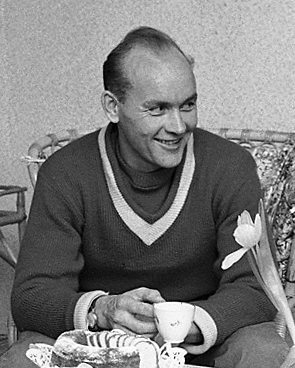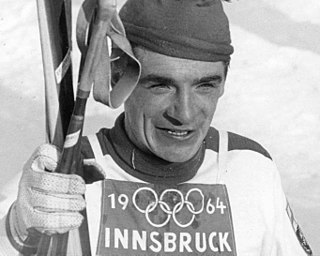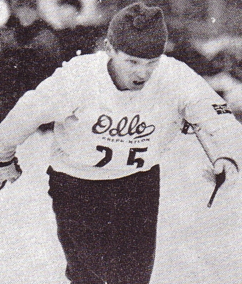
The biathlon is a winter sport that combines cross-country skiing and rifle shooting. It is treated as a race, with contestants skiing through a cross-country trail whose distance is divided into shooting rounds. The shooting rounds are not timed per se, but depending on the competition, missed shots result in extra distance or time being added to the contestant's total.

The 1984 Winter Olympics, officially known as the XIV Olympic Winter Games and commonly known as Sarajevo '84, were a winter multi-sport event held between 8 and 19 February 1984 in Sarajevo, Yugoslavia. It was the first Winter Olympic Games held in a Slavic language-speaking country, as well as the only Winter Olympics held in a communist country before the 2022 Winter Olympics in Beijing, China. It was the second consecutive Olympic Games held in a communist country, after the 1980 Summer Olympics in Moscow, Russian SFSR, Soviet Union.

The 1964 Winter Olympics, officially known as the IX Olympic Winter Games and commonly known as Innsbruck 1964, were a winter multi-sport event which was celebrated in Innsbruck, Austria, from January 29 to February 9, 1964. The city was already an Olympic candidate, unsuccessfully bidding to host the 1960 Games. Innsbruck won the 1964 Games bid, defeating the cities of Calgary in Canada and Lahti in Finland. The sports venues, many of which were built for the Games, were located within a radius of 20 km (12 mi) around Innsbruck. The Games included 1,091 athletes from 36 nations, which was a record for the Winter Games at the time. Athletes participated in six sports and ten disciplines which bring together a total of thirty-four official events, seven more than the 1960 Winter Olympic Games. The luge made its debut on the Olympic program. Three Asian nations made their Winter Games debut: North Korea, India and Mongolia.

The 1976 Winter Olympics, officially known as the XII Olympic Winter Games and commonly known as Innsbruck 1976, were a winter multi-sport event celebrated in Innsbruck, Austria, from February 4 to 15, 1976. The games were awarded to Innsbruck after Denver, the original host city, withdrew in 1972. This was the second time the Tyrolean capital had hosted the Winter Olympics, having first done so in 1964.

Veikko Johannes Hakulinen was a Finnish cross-country skier, triple champion in both the Olympics and World Championships. He also competed in biathlon, orienteering, ski-orienteering, cross-country running, and rowing at a national level.

Seefeld in Tirol is an old farming village, now a major tourist resort, in Innsbruck-Land District in the Austrian state of Tyrol with a local population of 3,312. The village is located about 17 km (11 mi) northwest of Innsbruck on a plateau between the Wetterstein mountains and the Karwendel on a historic road from Mittenwald to Innsbruck that has been important since the Middle Ages. It was first mentioned in 1022 and since the 14th century has been a pilgrimage site, benefiting not only from the visit of numerous pilgrims but also from its stacking rights as a trading station between Augsburg and the Venice. Also since the 14th century, Tyrolean shale oil has been extracted in the area. Seefeld was a popular holiday resort even before 1900 and, since the 1930s, has been a well known winter sports centres and amongst the most popular tourist resorts in Austria. The municipality, which has been the venue for several Winter Olympics Games, is the home village of Anton Seelos, the inventor of the parallel turn.

Eero Antero Mäntyranta was one of the most successful Finnish cross-country skiers. He competed in four Winter Olympics (1960–1972) winning seven medals at three of them. His performance at the 1964 Winter Olympics earned him the nickname "Mister Seefeld", referring to the venue where the cross-country skiing and biathlon competitions took place. The Finnish Ministry of Education endowed him with the Pro Urheilu letter of recognition in 2000. There is also a museum centered on Mäntyranta in his birthplace of Pello.

Reidar Hjermstad is a former Norwegian cross-country skier and biathlete who competed in the 1960s and 1970s.

Denmark sent a delegation to compete at the 1964 Winter Olympics in Innsbruck, Austria from 29 January to 9 February 1964. This was Denmark's fourth time participating in a Winter Olympic Games. The Danish delegation consisted of two athletes, cross-country skier Svend Carlsen and speed skater Kurt Stille. Carlsen placed outside the top 50 in both his events. Stille finished 9th in the men's 10,000 meters, the best performance by a Danish athlete at these Games.

Vladimir Mikhailovich Melanin was a Soviet biathlete.
For the 1964 Winter Olympics in Innsbruck, Austria, a total of eight sports venues were used. Luge made its debut at these games, but were marred by the death of a British slider two weeks prior to the Games. A second ski jumping event debuted and the best two out of three jumps were used in both events for the only time in the history of the Winter Olympics. All eight venues would be used again when the Winter Games returned to Innsbruck twelve years later though the venues would undergo renovations in time for the 1976 Games.
The Men's 10 kilometre sprint biathlon competition at the 1984 Winter Olympics was held on 14 February, at Igman - Veliko Polke. Competitors raced over three loops of the skiing course, shooting two times, once prone and once standing. Each miss was penalized by requiring the competitor to race over a 150-metre penalty loop.
The Men's 20 kilometre individual biathlon competition at the 1984 Winter Olympics was held on 11 February, at Igman - Veliko Polke. Each miss resulted in one minute being added to a competitor's skiing time.
The Men's 20 kilometre individual biathlon competition at the 1980 Winter Olympics was held on 16 February, at Lake Placid Olympic Sports Complex Cross Country Biathlon Center. Each miss of the target cost two minutes, while hitting the outer circle cost one minute.
The Men's 4 x 7.5 kilometre biathlon relay competition at the 1976 Winter Olympics took place on 13 February, at Seefeld. Each national team consisted of four members, with each skiing 7.5 kilometres and shooting twice, once prone and once standing.
The Men's 20 kilometre individual biathlon competition at the 1976 Winter Olympics was held on 6 February, at Seefeld. Each miss of the target cost two minutes, while hitting the outer circle cost one minute.
The men's 20 kilometre individual biathlon competition at the 1968 Winter Olympics was held on 12 February, at Autrans. Each miss of the target cost two minutes, while hitting the outer circle cost one minute.
The Men's 20 kilometre individual biathlon competition at the 1960 Winter Olympics was held on 21 February, at McKinney Creek Stadium. The firing ranges were located at the following points on the 20-kilometer course: 6.5 km — 200 meter range, 9.5 km — 250 meter range, 12.5 km — 150 meter range and 15 km — 100 meter range. The first three series were fired from a prone position, the last standing. Each miss of the target cost two minutes.
The 4 × 10 kilometre relay cross-country skiing at the 1976 Winter Olympics in Innsbruck, Austria was held on Thursday 12 February at Seefeld. It was the ninth appearance of the 4 × 10 km relay in the Winter Olympics.










